- Home
- Robin McKinley
Chalice Page 2
Chalice Read online
Page 2
Chapter 2
She walked slowly back toward the deep end, murmuring to the earth and the earthlines, tossing sweet mysterious drops into the shadows of the ravine. The earth under her feet still shook, but the shaking now seemed more like that of something shaking itself back together again after a shock or an unbalancing blow: like the turning sock in the hands of the darner.
The crevasse was disappearing.
There was a shout ahead of her, and she saw the horses take the strain; and then they sank into their harness and began to pull. The ropes went taut - tauter; the horses began to move.
"And would you please let Daisy and her calf, and the man in there with them, climb out safely," said Mirasol, and flung more water and herbs and honey. The stones rattled; there was not much of her mixture left.
She saw the head of the cow emerge from the darkness; then her muddy body and finally her lashing tail. She staggered and stood, head low and feet braced. The horses halted, and someone moved to release her. The horses stepped forward again, but the second rope came easily, and a tiny, equally muddy version of Daisy popped out, like a terrier from a hole; and then someone - Faine - was lying by the crack, and reaching his arms into it, and there came the man who had gone into the trench to tie the ropes around Daisy and her calf, and he was the muddiest of all.
"Thank you," said Mirasol. "You can finish now, please," and she emptied the last dregs of her cup into the closing crack, catching the stones in her other hand. Perhaps she should not have run forward so quickly and eagerly; when the last of it closed, it closed with a tremor so violent that one of the horses stumbled and whinnied, and the man at their heads fell down.
But it closed. The field was a field again, with nothing to show for what had happened but a slender ragged ridge where the ravine had been, where the grass now grew at peculiar angles. Daisy turned abruptly, and began vigorously to lick her calf. Faine still had an arm around his muddy brother, and Mirasol realised he was laughing.
The words then came to Mirasol; perhaps she had read them somewhere, or perhaps the earthlines had whispered them to her after all. She said them softly, but Faine and his family turned and stood motionless, listening with the earthlines: Lie thou there, thou earth. Stiller than starlight, stiller than silence, stiller than darkness, stiller than death.
She thought of that day as she plucked at the fraying, grubby margins of the bandage on her hand. She changed the dressing every day, but wrapped it up again in the same cloth (which she had finally learnt to do one-handed). She should change it; a grimy bandage did not reflect well on the dignity of the Chalice. She sighed. A grimy bandage on the hand of a beekeeper would make no difference.
She wondered what Faine had said of the occasion. And she thought: nothing. He will have said nothing. It should not have happened; in a demesne not teetering on the edge of disintegration it would not have happened. It was less important to acknowledge that the Chalice had dragged them all back fractionally from that edge than it was to pretend that they were not that close to it in the first place. But this was, she thought sadly, extremely hard on the Chalice.
She recognised that she wanted this Master to succeed for reasons that were also to do with herself, Mirasol, within the Chalice, whose only apprenticeships had concerned bees and woodscraft. She wanted him to succeed because she knew how difficult accepting the Chalice had been for her - and how difficult it was for her now to put out fires and drag back from edges and be ignored. She wanted her Master's help - help because she was Chalice but also because she was Mirasol. Help to put their demesne back together so that the earthlines would never again cry, Broken, broken. Help to lead Willowlands home. But she recognised the exhaustion in the Master's strange eyes because she knew it in herself. And as the weeks passed after the new Master's arrival, she recognised something else in his eyes, though she had a harder time putting a name to it.
When she had been a woodskeeper, things like Chalice and Master - and Grand Seneschal, Prelate, and Overlord's agent - were impossibly beyond her. Even when everyone in the demesne knew that their former Master was out of control and his Chalice pulled in his cataclysmic wake, the ordinary folk, herself included, felt only anxiety and fear. There was no task or duty a beekeeper or woodskeeper could take on that would change the situation. The isolation of the Chalice was certainly on account of all the Chalice needed to know that no one else knew, all the tasks the Chalice needed to perform that no one else could perform; but she had never minded hard work, and her father's woodright and her mother's beehives had always been attentively kept because she would rather be doing something than not. It wasn't the work of the Chalice she minded. It was the vast unfathomable burden of its responsibility. She still felt the Chalice was incomprehensibly beyond her - even wished that it were incomprehensibly beyond her, so she could give up. In despair, perhaps, but because she had no choice. She felt that something of this same despair was in the Master's eyes now, and perhaps only she could read it there.
And perhaps it was her duty to report it to the Grand Seneschal, or the Overlord's agent. Because even above the Chalice's duty to the Master was the Chalice's duty to the demesne. But she would not report it, any more than she would report herself. She was not a good Chalice, but she was all they had. The Chalice had come to her, and it remained with her: and as Chalice, her judgement was for the new Master. She clung to this thought sometimes, when her mind blundered like a shying horse among all the shadowy, threatening-looking things she didn't understand, or like a bee caught indoors, bumping into walls and windows, looking blindly for a way out of this bewildering and inexplicable new landscape. Despair was a private weakness she could not afford to indulge.
But when she remembered that day at Faine's farm - or those many, many other days that she'd put out a fire or darned a sock or propped up a fallen fence - she didn't remember that she had succeeded. She remembered that she had had no idea what she was doing, and no idea why it worked. It did not feel to her, remembering, like an indication that she was learning her job, evidence that she was, after all, fit to be Chalice. It felt like something she had got away with, that she might not get away with again.
But there was something more that troubled her, something that troubled her most of all about the accident on the day of the Master's return - the accident that everyone believed was a sinister portent to begin the new Master's reign. She wondered if anyone but herself knew, or would remember, that it was a capital offence to injure a Chalice, even for a Master. She especially wondered if the Overlord's agent knew of this old law. In the early, barbaric days of the demesnes, at least one Master had been put to death for it.
She'd read about the execution in one of the oldest records available to her. Some of the Willowlands Chalice records were unique, she just didn't know which ones; and this one was obviously a copy, although there was no telling if any other copies still existed. Perhaps no one else knew that the law had ever been enforced. Most of the cruellest laws were no longer put into practise, but there were unpleasant traces of those old ways still. And the presumption remained that a law that had once been used, however rarely or long ago, was stronger than even a recent law which had never been anything but words in someone's mouth or written on a page. Much worse was the lingering belief that a law with blood on it was somehow live. Forever.
She was reasonably sure that no one could move against a Master for harming a Chalice unless the Chalice agreed to bear witness. But that would only place her in the trouble she wished to keep him out of, because perjury about a capital crime was also a capital offence, and the Overlord's agent had seen what happened.
There was so much she didn't know.
And then the wound refused to heal. This didn't surprise her; it was in a bad place, and she could not keep the hand still when she was in public, and so she forgot to keep it still when she was alone. It was also difficult to do even the most ordinary tasks with only one hand, especi
ally when your mind was elsewhere - and, Mirasol thought grimly, my mind is always elsewhere.
Since the new Master had come, she had spent additional hours nearly every day at the House or one of the points of the Circle, holding a cup for this or that meeting or conference or rite. Since no one had ever tried to reclaim an Elemental priest for Master, there were no records of how that should be done either, and it was not surprising there were many discussions about it, and attempts to adapt the traditional bonds between Master and demesne, and repeated official visits to various important bloodright sites to reinforce, or recover, those bonds - to recover the demesne itself. Some of this was also the natural result of a new Master and his Circle learning to work together; some of it, Mirasol hoped, was that the other Circle members were taking up their tasks again. But she began to suspect that there were more of these meetings and visits, and her presence was more often required for the most minor of them, than would have been the case if her hand had not been burnt offering the cup of welcome in the first moments of the Master's coming.
And she became increasingly aware that the Circle, as it was now constituted, was not learning to work together. And that Willowlands remained still far from whole.
Every day her mind swam and struggled while her face and body demonstrated serenity and control. She went home exhausted every night, with the Master's exhaustion haunting her. What a pair, she thought sadly. Poor Willowlands. Furthermore she had even less time to pursue her studies - and she urgently needed to continue her studies. She had grown accustomed to sleeping badly as a result of not being able to turn her thoughts off; now she slept worse on account of the pain in her hand. She lay awake in the dark, thinking about what she could be learning if she sat up and lit a candle, and too bone-weary to fumble for her tinder-box.
But since the Master came, she thought, am I not putting out fewer fires?
Perhaps that is only because I am spending too much time bearing Chalice to a Circle who will not let me bind them together?
Is that my failure or theirs?
She should be asleep now. But you could pick at a dingy bandage in the dark and put off making even the tiny additional decision of lighting a candle.
Why had the previous Chalice taken no apprentice? Had her Master stolen even this from her? And had the rest of the Circle made no protest? Was there any protest they could have made, if he would not listen?
Eleven Circle members had apprentices (and the Master had his blood Heir). The Circle met to choose a new Circle member on the death of the previous one, but they were supposed to know which way the finding rods would fall before they cast them, because the rods had confirmed the choice of apprentice when it was made. There was a story that this Circle had had no idea if there were some other procedure involved in finding an unknown Chalice than a known one - and had cast the rods over and over, refusing to believe what the rods persisted in telling them - wanting to believe poor Clearseer, who had taken over from his master when the previous Clearseer had died with the Master and Chalice, was somehow undoing the unity of the Circle by his inexperience. She believed this story. It was one more item in the litany of confusion and chaos the previous Master had created.
Her own lack of apprentice was another. One of the first tasks of a new Circle member was to choose an apprentice: but a new Circle member should have spent years as an apprentice, and been ready to pick up both insignia and duties. . . including the training of an apprentice. And the demesne should be stable enough to disregard the small muddles a beginning apprentice had to make, to learn what she needed to. An apprentice relied on the Circle member who trained her to protect both her and the demesne from the things she did wrong, till she learnt better. Mirasol could not do this for herself, let alone for another, even more ignorant, even more inexperienced person; and Willowlands was not stable.
She had spent her first weeks trying to learn the very simplest of the rites that had been neglected in the weeks since the last Chalice died, complicated by the unbelieving daze of finding herself in the position to need to do so. She had had her own struggle to believe what the Circle had come to tell her. What had finally convinced her that the Circle hadn't somehow made a mistake was their own resistance - ranging from dismay to fury - to the idea that she was the chosen. That the terrifying things that had been happening to her in the wake of the old Chalice's death were something more specific than merely the general shambles that death had left. She had spent some time too in those first weeks trying to discover if perhaps the Circle had made a mistake after all - and coming reluctantly to the conclusion that they hadn't because they couldn't. That was the purpose of the rods. The rods could not lie nor be suborned. A conclusion she assumed the Grand Seneschal had equally (and equally reluctantly) come to or she would not have remained Chalice.
That, and writing to the priests of Fire, were the only subjects upon which she and the Grand Seneschal had ever agreed. The letter to the priests had happened before she had been found as Chalice. She had often wondered about the meeting for the finding of the new Master. The rods were absolutely reliable within their own demesne - one of the tales of their origin was that they were fragments of earthlines made material, created in the days when the demesnes were first shaped and magic was wilder and more brutal than it was now - but far less so when the answer they sought lay outside it. She knew that many, perhaps most, of the rest of the Circle were not happy with the Grand Seneschal's choice, and she wondered how he had carried his point. The rods at least must have supported him. Or perhaps the rest of the Circle was as afraid of him as she was.
Despite her weariness she usually woke before sunrise; lately it was her hand that woke her, for it was often worst when she wished to sleep. This morning there was a meeting in the East Hall during Dawnspan, which meant it had to end at a given time and could not drag on forever as last night's, with no defined term, had. Yesterday evening's sky had told her that the morning would be sunny, so there would be no excuse of not noticing when Dawnspan ended.
She picked up the cup of tranquillity - she'd been using that one a lot lately - and mixed the Ladywell water, young spring wine, grey clay, willow and cherry ash, six herbs, and two kinds of honey to go in it. It was almost the standard recipe for Connection, and one of the first an apprentice Chalice would have been taught, except for the honey, which was Mirasol's idea. She propped the book of common incantations up where she could glance at it while she dressed. She already knew the invocation for Connection by heart, but she felt painfully stuffed full, however erratically and inadequately, of new things, and preferred not to rely on her memory if she didn't have to. Although the open book was more a gesture than an opportunity for study, since it was still too dark to read. But it was comforting to have the book out too, like having a friend in the room with her. She didn't have many friends any more; her old ones were afraid of her, and the people around her as Chalice didn't want her among them.
Her way to the House from her cottage lay across the expanse of parkland where the great party for the investiture of the new Master had been held. The traditional place for the Master's investiture was a much larger piece of open parkland at the front of the House, instead of in the smaller stretch between the House and the beginning of the eastern woodland. Clearseer - who was the only member of the Circle willing to gossip with the Chalice - said that the rumour was that their new Master had said that his banquet could be held anywhere but where his brother's had been.
"The reasons given vary from his hatred for his brother to wanting to signify a new beginning to a realisation that since his people are afraid of him they probably won't turn out for his party and a smaller space will make this less embarrassing. " Clearseer frowned, then shrugged.
"Which reason do you favour?" asked Mirasol. She wished she felt more comfortable with the Clearseer. She had no reason to mistrust his motives but, as the newest member of the minor Circle in a time of great strain and disorder, he
was second only to herself in unpopularity with the rest of the Circle. And as a minor member, he could do worse than to curry favour with the second most powerful member - however unpopular. On the other hand, as Clearseer he should be trying to keep - or restore - honesty and openness in the Circle. Good luck to him. Even a stronger Circle than the one in place could be expected to be wary and suspicious after the seven years they had had under the previous Master.
"The new clean beginning, of course," said Clearseer promptly. "But I'm afraid there may be something to the reason for choosing a smaller space. "
Mirasol remembered the investiture feast for the previous Master. It had been wilder, the games and contests more reckless, and the wine unwatered and over-liberal, than felt either appropriate or safe. She had come with her parents, but they had not been happy or comfortable, and neither had she been; she remembered that many of the people she spoke to were wondering uneasily if this was a foreshadowing of what was to come. She remembered - she had thought of this often in the last months - how she had thought the Chalice looked regal but fragile, and several of the other Circle members as if they weren't sure what their duties or responses should be. The Prelate had been fawning and the Grand Seneschal had been grim - and she had been very glad that she need have nothing to do with any of them.
She remembered the Master's younger brother too. He seemed to stay as far away from his brother as he could, to take part in none of the games, and to drink no wine.
The new Master's party had gone off without incident but it had not been an enormous success either - or perhaps she was only too tired to notice after the investiture, which had required three different cups of her, a complex invocation, and far too much contact with both the Grand Seneschal and the Prelate. What she remembered the most was the way the Master had sat isolated, in the middle of what should have been his own people. The inaugural party was the one time, sometimes in their entire lives, when all denizens of his demesne could approach the Master directly and for no reason but to congratulate him and ask for his blessing, and usually there was a crowd of people doing just that. There had been for his brother's feast, although she had not been among them; he was kissing all the young women, and she hadn't wished to be kissed.
There had been few enough brave souls who had asked for this Master's blessing. She had stood by or near him some of the time - several times changing her mind whether her conspicuous presence would make things worse or better - and she knew a few of the people who did come: her woodright neighbours Selim and Kard, the herbswoman Catu and several farmers whose lands opened out south and west beyond the forest, although she didn't see Faine. She also saw from her eastern quadrant the sunny-natured shepherd Lody, who was a favourite with everyone who knew him; she was glad to see him so conspicuously casting his vote for the new Master. She recognised several Housefolk, including one or two of the House gardeners and Naz from the kitchens, who had been one of her best customers for honey for years and whose honey-glazed bread and biscuits, she had been told before she became Chalice, were locally famous.
The Master didn't try to touch any of his supplicants, which was unusual but not unprecedented. Instead he made the signs for joy and prosperity in the air between them. Mirasol noticed that he was wearing his gloves again. The gloves were daunting, but she thought of his ember-red fingertips and the blazing heat of his naked flesh and felt relieved. Once when she stood beside his chair she noticed that the gloves were no longer laced, but wrapped round and round and tied in place like bandages, as if, perhaps, he wished to do it himself, and had chosen an easier method to learn one-handed.
She guessed that when those present began to feel more certain that he would make no attempt to touch them with his dangerous hands, a few more of them began to come to him for his blessing. But he was undoubtedly an eerie figure. He sat on a tall chair carried out from the House for this purpose, and which looked almost as out of place sitting on the park grass as he did sitting on it among ordinary ambling humans: and Masters usually walk among their people on feast-days, rather than sitting broodingly still. The hem of his black cloak still moved to a breeze no one else felt. A single magnificent tree stood in this parkland, and the Master's chair had been set at the edge of its canopy and so, thought Marisol, with the tree as background, the Master looked majestic as well as eerie; but this did not make him seem any more approachable. He looked, she thought, like the model for one of the paintings in the long gallery at the back of the House, which were of scenes from the ancient days, when the demesnes were first being created. The Master might have been one of those early magicians: powerful, perhaps too powerful for the mundane world, and for good or evil no one could say for certain.
Enough musicians had come to make a good energetic noise, although there was little dancing, and Mirasol felt that too much of the music was mournful. The mountains of food on the tables had disappeared by the end of the evening; how much of it went home under coats and cloaks for the people who hadn't wanted or were too frightened to come, she didn't know. A lot of it had seemed to go rather suddenly and rather late, although that could be merely that it had taken a while for most people to relax and realise they were hungry. But at least when midnight came and the Circle piled up the remains of the food in the ceremonial salver - which was more of a small travelling hearth, and had to be effortfully carried by four Housemen - and the Chalice poured the dregs of her last cup over them and the Talisman broke one of her wafers over them and the Prelate gave thanks as the Grand Seneschal set fire to the little mound, there were only the correct few handsful left. And - despite the Master's presence - the bonfire burned sedately and, having burnt itself out, politely collapsed. There were barely even any sparks to stamp out, and the Housemen, noticeably wary as they took hold of the handshafts to carry the salver away again, visibly found them no hotter than they should be.
The inaugural ceremony was months ago now, and the parkland where it had been held showed no trace of it, although Mirasol always glanced at the old tree standing by itself where the Master's chair had been. This morning it was a silhouette from another world: no earthly tree's branches could reach so far, as if it were trying to protect the entire demesne. From what?
She was the first in the Hall for the morning's meeting, where the great windows were still twilight-grey. The early fog was beginning to burn off, but at the moment it still lay so thick upon the grass that from the House the trees on the far side of the drive were barely visible, and her shoes and cloak were wet from the walk from her cottage. She set the cup of tranquillity on the window-ledge, sat down beside it, unlatched one of the panes and welcomed the breeze into the big room to do what it could to dispel the heaviness of the air, heavy here as it was everywhere in the House. She had never been inside the House when the old Master had been alive, so she had nothing to compare with, but she hoped that one of the things having a Master again would do was make the air in his House light and free. After only the few moments needed to slip through a side door and make her way to the Hall she already felt the need of the reviving fresh air.
Just the fact of sitting down was a treat. When she was bearing Chalice, she had to stand. She could lean - she wondered if the traditional Chalice habit of lurking in doorways had anything to do with the fact that it was usually possible to lean against a doorframe - but she couldn't sit down. She had very nearly thought she wouldn't survive the sheer physical strain of all the standing; but about three months after the Circle had found her, she discovered the handful of pages stuffed into the back of one of the chronicles describing exercises to strengthen the back and legs for long hours of standing. For muscles accustomed to exercise their strength in movement - a woodskeeper's job was not physically easy - to bear motionlessness instead was a strange discipline.
But that was only one of the aspects of the life of the Chalice she had thought she might not survive.

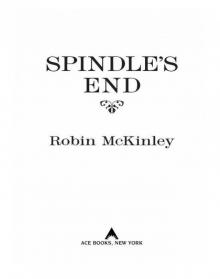 Spindle's End
Spindle's End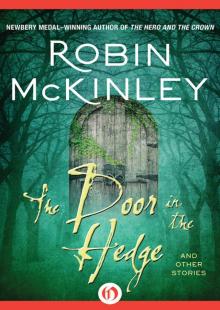 The Door in the Hedge: And Other Stories
The Door in the Hedge: And Other Stories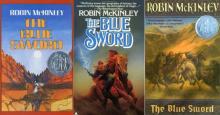 The Blue Sword
The Blue Sword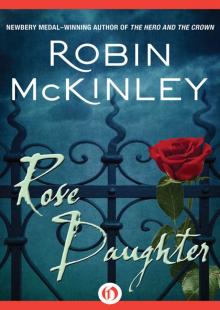 Rose Daughter
Rose Daughter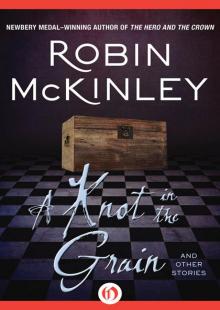 A Knot in the Grain and Other Stories
A Knot in the Grain and Other Stories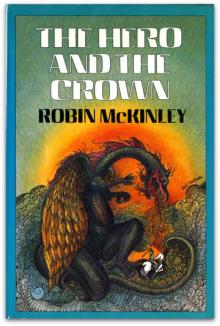 The Hero And The Crown
The Hero And The Crown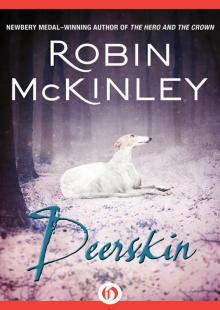 Deerskin
Deerskin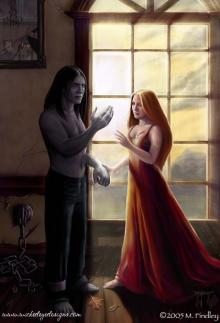 Sunshine
Sunshine Beauty: A Retelling of the Story of Beauty and the Beast
Beauty: A Retelling of the Story of Beauty and the Beast Shadows
Shadows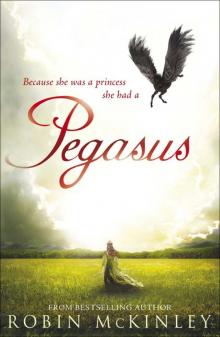 Pegasus
Pegasus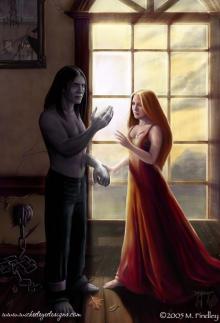 Chalice
Chalice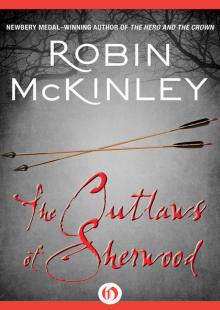 The Outlaws of Sherwood
The Outlaws of Sherwood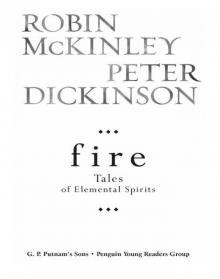 Fire: Tales of Elemental Spirits
Fire: Tales of Elemental Spirits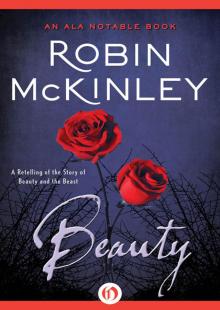 Beauty
Beauty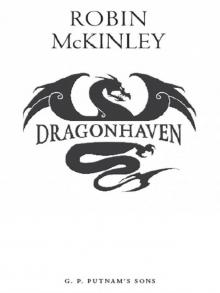 Dragon Haven
Dragon Haven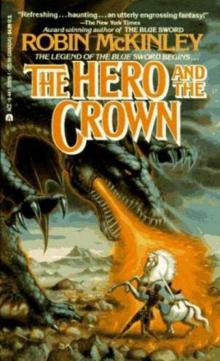 The Hero And The Crown d-2
The Hero And The Crown d-2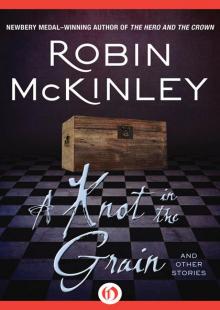 A Knot in the Grain
A Knot in the Grain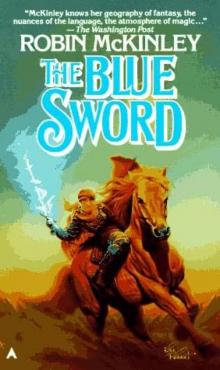 The Blue Sword d-1
The Blue Sword d-1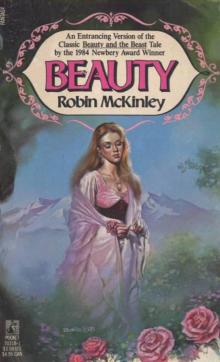 Beauty (v1.2)
Beauty (v1.2)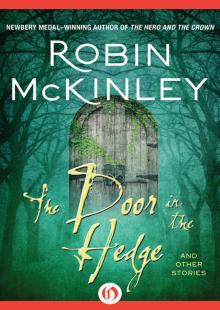 The Door in the Hedge
The Door in the Hedge